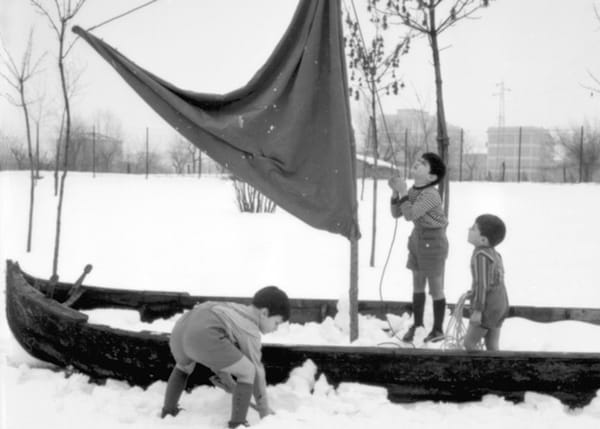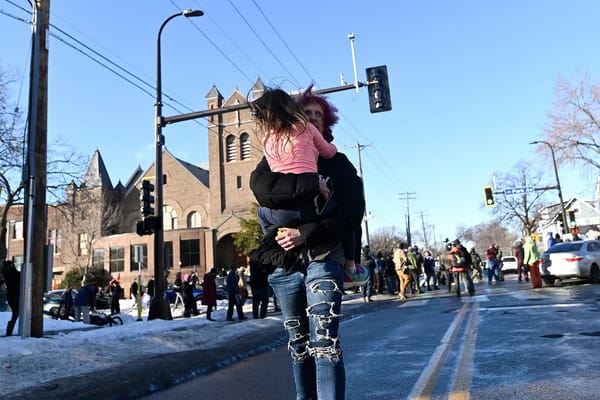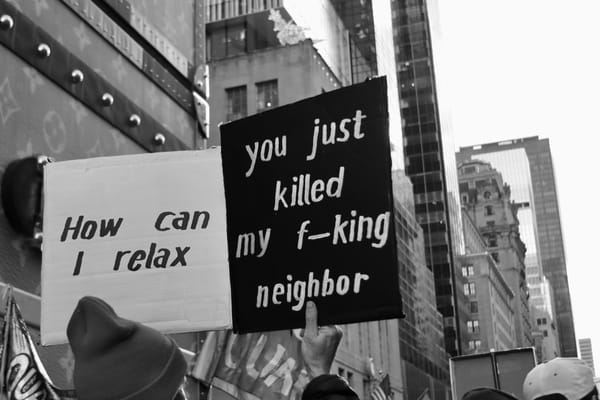Redefining Gratitude
Allowing ourselves to feel overwhelmed

“Then you hold life like a face
between your palms, a plain face,
no charming smile, no violet eyes,
and you say, yes, I will take you
I will love you, again.”
~Ellen Bass
I used to relish Thanksgiving, but it’s worn on me in recent years. And given the flood of ink that is devoted annually to guidance on surviving a holiday that is supposed to be rooted in feeling grateful, it seems I may not be alone.
I’m a winter person, so I’ve always reveled in the crisp air that late November brings, as the last of the red and yellow leaves give way to bare branches. And I always loved the coziness of the apartment I grew up in filling with the smells of pots simmering and the warmth of family and friends crowding into a small New York kitchen, as various dishes were moved through the oven in shifts. I loved the childish exuberance of the parade, too, with its absurdly enormous balloons. I think the same part of me that is at home with young children still finds magic in experiences that light up their eyes. And I always loved the day after Thanksgiving with its slower, more intimate rhythms. I do still love many of these things, as they spring up throughout the year in other, less ritualized forms, but I don’t feel the excitement of the holiday itself in the same way anymore. Some of this surely has to do with the ways that family life has morphed for me over the past decade or so. For mostly extremely ordinary reasons and a few not-so-ordinary reasons, the bustle of rooms overflowing with people just isn’t how my family organizes itself anymore. So there’s certainly a feeling of loss that flows through Thanksgiving week for me, as I know is true for many people.
But I also think that all the prolific warnings about how to survive Thanksgiving (a holiday that is already burdened by its own dark roots) are indicative of how the concept and experience of gratitude have become somewhat warped, making it harder to sink into rituals of thankfulness with a deep and authentic sense of appreciation and bounty.
As gratitude has pervaded the wellness sphere—much like “self-care” and resilience—I think we’ve lost the thread on its deeper meaning and on the powerful role that sincere gratitude can play in our emotional and communal lives. Additionally, as we have become more pervasively angry and isolated, obligatory encounters with extended family have also grown more fraught for many people, requiring difficult decisions, weighing the bonds of family against personal values or even individual humanity. This is certainly not a new experience of the holidays for many folks. Family can be our most accepting safe haven or it can be a gauntlet, repeatedly requiring us to prove our worth. As a parent, I think about the notion of a safe haven as a north star. I remind myself often, when I’m unsure of how to respond in a particular moment, that my primary goal is to lay a foundation of security, acceptance, and “home” that can be returned to in a literal sense and also carried internally out into the world as a grounding force. When our loved ones find this feeling of safety elusive at their own family table, something has gone amiss in our expression of care.
As Thanksgiving winds down and we come to the other side of this complicated week, I hope that, if it is a holiday that offers you an opportunity to sink into that feeling of safety, acceptance, and warmth, you are both nourished and renewed in your commitment to foster that feeling for others. If, on the other hand, it is a time that requires you to make difficult personal decisions or to steel yourself in some way, I hope that you’ve found a path through and that you can be nourished now by returning to the people and places that offer you safety and belonging. And if this is a time that is marked more by loss than by bounty, I offer you a reminder that we are always less alone in this feeling than we realize, and that sadness is a conversation with love, which grants its own fullness. Remember John Koenig’s definition of sadness,
“When we speak of sadness these days, most of the time what we really mean is despair, which is literally defined as the absence of hope. But true sadness is actually the opposite, an exuberant upwelling that reminds you how fleeting and mysterious and open-ended life can be.”
It can be hard to connect this "upwelling" to a sense of gratitude, but I think it may actually be among the most rarified forms of gratitude.

Each of these experiences offers insight into an understanding of gratitude that is important and healing in its own way and that can draw us a map pointing toward our most necessary and valuable work. But, in order to understand the map, I think we first need to let go of some of the definitions and expectations of gratitude that have pervaded the popular narrative.
First, there is a complexity embedded in our understanding of gratitude as both an emotion and an obligation. Even dictionaries don’t seem to handle this nuance consistently, defining gratitude variously as a feeling, a state, a quality, or an act. Both the emotional state of gratitude and the ethical act of showing or expressing appreciation are valuable, surely. But I don’t think they are necessarily one and the same.
In considering the distinction between the emotional experience of authentic gratitude and the act of showing appreciation, I was reminded of the actor, Andrew Garfield, who recently went viral as he became emotionally overwhelmed in the midst of recording the voiceover for a Modern Love story. When asked to explain what had caused him to well up with feeling in that moment, he said, reflecting on the author’s experience in the story he was reading,
“It’s the preciousness…and it’s the longing for more. We all live, we all pass with so much more to know, with so much more longing…a longing to be here...It’s like the finite nature of us being here is the only thing that makes it meaningful.”
For me, much in the way that Koenig’s definition of sadness widens the scope and meaning of a feeling we think of as simple, Garfield’s explanation here feels like a beautiful and expansive definition of gratitude. He describes an intense awareness of the preciousness that exists in our lives, coupled with recognition of its fragility and of the universality of longing for more of that preciousness and for less loss—even though it is the loss itself that creates preciousness.
When I recall the moments that feel most marked by authentic gratitude, not by pat recitations of things I ought to appreciate, they are not cognitive or cerebral experiences. Rather, these are moments of deep and often unexpectedly embodied upwelling—moments when love or beauty or connection have felt suddenly and overwhelmingly acute. These unbidden recognitions of the breadth and grace and grandeur that the world has to offer, even within the relative smallness of our individual lives, go hand in hand with our awareness of how precarious and therefore valuable these offerings are.
There is extensive research on the positive impact that gratitude can have on our sense of happiness, wellbeing, and even on our physical health. I think these benefits are likely rooted in the wider perspective that can be embedded in authentic recognition of love, hope, beauty, and a sense of connection in our lives. There is perhaps no greater antidote to despair or inaction than being reminded of all that we wish to preserve and extend.
And because it is so easy in our busy, overstimulating, and at times genuinely frightening and isolating world, to become overwhelmed by cynicism, it makes sense that we would need to help our brains find the pathways of gratitude and that we would need to craft practices and rituals in order to make those pathways robust enough to hold up against all that challenges our ability to see the good.
I also think that there is value to the moral valence of being reminded to express appreciation for one another and to take honest stock of our privileges and good fortune. These are habits of mind and action that it is extremely easy to let slip in our highly individualistic and often aggressive culture of achievement over goodwill and communal abundance.
However, both the potential psychic benefits and the larger moral good that all of this presumes we are granted with our gratitude gets muddy when our definition of gratitude becomes thin and slippery.
When we conflate the emotional experience of gratitude with the moral calisthenics of taking stock and expressing appreciation, I think we often begin to lose touch with the profound nature of the emotional experience as revelation rather than as a checklist. The deep emotional awareness of how precious and fleeting life can be, which Garfield describes, isn’t something we can be instructed to experience or something that we will find by simply going through prescribed motions. This doesn’t mean that rituals of gratitude are not worthwhile, but like all rituals they lose their transformative power if we forget that they are not ends in and of themselves.
There can also be a quality of social pressure in reminders to focus on gratitude. Often, when we are reminded to be grateful, it is more a reflection of discomfort with distress or an inability to tolerate difficult emotions—either on the part of someone else requesting that we focus on gratitude or even in our own self-inflicted reprimands. Just as you have probably never felt calm because someone told you to “calm down,” I would wager you’ve never felt more grateful simply because someone told you that you ought to be grateful. This is because, in both instances, the instruction is rooted in a desire to tidy up complicated feelings by replacing them with feelings we presume are easier, more manageable, and more acceptable.
Even more problematic, these reminders are often laid most heavily upon the shoulders of those whom society and history typically expect some level of submission or subservience from. I don’t think it’s a coincidence that an entire industry of journals and candles has developed around selling messages of gratitude to women. The call to gratitude can morph into a lullaby that soothes us into adjusting to structures of dominance. After all, if we are constantly reminded of the importance of our gratitude and of all we are lucky to have, we will likely also be more accepting of our powerlessness. While gratitude in its pure and sincere form can be healing and inherently connective, it is worth being alert to the directionality of expectations of gratitude and wary of demands that we be grateful concealing admonishments not to expect more.

True gratitude makes us more compassionate. Gratitude that is wielded as a means to keep us in our place does the opposite; it instructs us that we must both guard what we have and promise not to ask for more. As Michal Zechariah notes,
“The expectation of gratitude risks deepening existing social gaps, since the less powerful in society will be forced into perpetual humiliating indebtedness, with the more powerful left to enjoy the role of charitable benefactors.”
Research shows that gratitude, in the context of structures of power, can even lower moral inhibition. By cultivating a sense of indebtedness or protection of a perceived benefactor, we can become more prone to violate moral norms on behalf of that benefactor. Wherever loyalty and obedience are prized, we should listen especially carefully for the invocation of our gratitude.
In addition to remaining wary of and resistant to versions of gratitude that lull us into accepting obligation, I think it is also worth being cautious of forms of gratitude that elevate our individual good fortune over collective abundance with an air of self-congratulation. The view of gratitude as a personal practice toward self-awareness reflects a morphing of the value that has occurred over time, as we’ve elevated the individual above the collective good. Earlier understandings of gratitude positioned it as a primarily social experience. As Zechariah explains, rather than viewing gratitude as a source of personal wellness, it was viewed as an inward experience that “derived its value from its interpersonal nature.”
Gratitude, through this lens, may be felt personally but it serves to remind us of our interconnectedness. This version of gratitude is also susceptible to the risk of entrenching indebtedness and subservience. But, when we are able to channel the kind of awareness of our common humanity that Garfield describes into generosity and a cultivation of communal care, gratitude toward a collective rather than a personal end seems a more worthy function than the self-improvement practice that is often sold to us.
So, in order to return to a form of gratitude that is authentic and connective, I think we might be wise to move away from creating lists of blessings and, instead, to practice paying close attention to the moments that cause a swelling of love and belonging or an awareness of the preciousness that exists in closest proximity to fragility. This may seem a tall order, but when we start to actively look for these moments, they abound, because they are often found in the smallest experiences.
I’ve felt this upwelling of gratitude for my son in the smallest moments with him, when love suddenly overflows its usual containment, often for no apparent reason. I’ve felt it in those experiences of uncontrollable shared laughter that become briefly all consuming. I’ve felt it in the rush of a hawk swooping just above my head to land in a tree beside me, reminding me of all that survives even in the most seemingly unsurvivable circumstances.
These are the moments that inspire a sense of deep connection, mutual dependence, and even awe. And they are more common and often smaller than we might realize. They serve as reminders of how big and complex the world is—reminders that it is possible to experience intense and overwhelming grace, even when there is so much that may feel bleak, and that true moments of gratitude don’t emerge out of our tallies but out of love and longing and deep, purposeful attention. It is these moments of sincere and authentic gratitude, I think, that provide us with the nourishment to continue, even when it’s hard. They are impossible to conjure, but they are worth marking and surrendering to whenever they engulf us.
Wishing you preciousness and longing,
Alicia
If you think someone else in your life might need some hope, please share. It’s always easier to hold onto hope when we’re not doing it alone.





